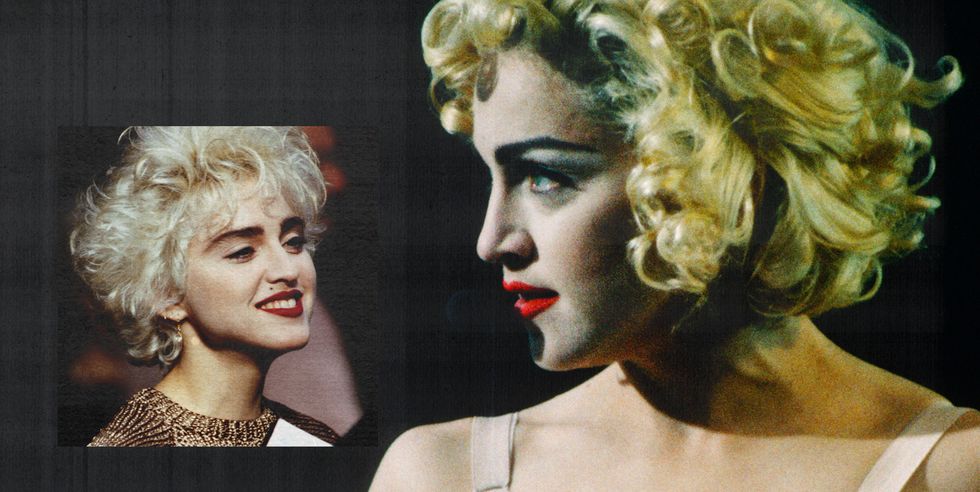Music legend Madonna made an appearance at the Grammy Awards on Sunday to introduce Sam Smith and Kim Petras as they sang their award-winning smash song, Unholy, following her recent announcement of a world tour. However, viewers had more to say about Madonna’s face than the pair’s jaw-dropping performance, raising the question of why people are still making comments about women’s appearances.
“This legit looks like a Madonna impersonator with pics of the real Madonna in the background. She really fucked up her face,” one person said on Twitter, with someone else writing: “Always admired and respected Madonna but what she’s done to herself, her face makes me so sad. We live in a world and society where a strong badass women still felt she had to do this to herself to be relevant, to be seen.”
Other people leapt to the singer’s defence, pointing out that pressure to conform to society’s beauty standards is the issue. “Even when madonna was 30, people always had something to say about her appearance, her body, her face or even her hands,” a fan tweeted, adding: “You guys talk about ‘age gracefully’ but… nothing is enough for you.”
“I cannot with people dragging Madonna. She’s a queen. She can do what she wants with her face,” someone else wrote. “People can have autonomy over their bodies!”
Taking to her own social media to wade in, life coach and author of The Selfish Romantic: How To Date Without Feeling Bad About Yourself, Michelle Elman, criticised one person who shared a side-by-side photo of Madonna with someone else around the same age. “Body shame is body shame,” Elman said on Instagram. “Attack the system, not the individual.”

“This is where we must think deeper, more critically,” she went on, stressing that people often change their appearance – through plastic surgery, for example – due to insecurities that have been triggered by society.
Elman rightly points out that society teaches us that “old women are invisible” and that “in order to be profitable you need to stay young.”
“[Society] says the way you look is always the problem,” she continued. “The individual is just a product of the system that they aren’t good enough as they are.”
Sadly, Madonna isn’t the only woman – famous or not – who’s been subjected to such comments. It’s an issue that transcends age groups too. Take Geordie Shore’s Charlotte Crosby, for example, who was the focus of a two-part TV series back in 2021 titled, Celebrities: What’s happened to your face?.
The show (which featured the tagline, “The facial flaws of the famous”) received 7,125 complaints to Ofcom, and Crosby herself took to social media to brand it “immoral and insensitive”.
On the flip side, last year Sarah Jessica Parker called out the “double standard” of ageing as a woman, noting how she’s experienced repeated criticism for her decision to – as some would put it – ‘grow old gracefully’. PSA: there’s no right or wrong way to grow old.
“I’m not angry, it’s just an observation… Some of it hurts for a minute, it smarts. And some of it confounds me because of the double standard that is so plainly illustrated,” she told Allure, referencing how a photo of her with grey hair went viral, yet there was no fanfare over the grey hair of TV presenter Andy Cohen who was also in the shot. Instead, Cohen – much like other men – was labelled a ‘silver fox’. Parker’s comments echoed those of co-star Kristin Davis who previously said: “It can be extremely stressful to be ageing and to be compared to your much, much, much younger self.”
As Elman said so perfectly, it’s not the appearance of women that ought to change, but rather society itself. “When we body shame someone else, it’s often a reflection of our own insecurity. There is a moral superiority that comes now with looking down on women who succumb to changing their appearance but if we are still ranking women or comparing one to another, it encourages the same problem,” she told Cosmopolitan UK. “Instead, we need to remove body shame from all conversations and understand other people’s decisions about their body is none of our business.”
Whilst Madonna is a public figure so recognisable she doesn’t even need a surname, that doesn’t give any of us the right to comment on her appearance – but we could all use this moment (and forensic examination of her face) as a springboard for a wider discussion on things that need to change, as well as reassessing our own inner dialogue and biases.
When it comes to commenting on celebrities or even acquaintances and “how well they’ve aged,” are we all totally guilt-free? Even if they are meant to be complimentary, isn’t it time to put those remarks—along with the assertion that someone has “lost weight and looks well for it”—into the forbidden list? We all gain greater power when we stop evaluating others based solely on their appearance, whether it’s good or terrible. notwithstanding our age or past experience with cosmetic surgery.

